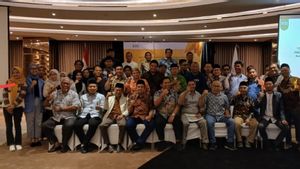JAKARTA - Government regulations related to tightening cigarette products as stipulated in Government Regulation Number 28 of 2024 concerning Health still cause criticism. The regulation is feared to cause massive layoffs (PHK) in the tobacco products industry (IHT).
"Instead of creating jobs, this policy threatens the lives of many people. Instead of reviving the economy, this policy actually dampens the business sector, especially the tobacco products industry," said Member of Commission XI DPR, Willy Aditya, Monday, September 23.
The potential for layoffs is a necessity that will occur because PP 28/2024 regulates the number of restrictions on cigarette production, including the Draft Regulation of the Minister of Health (RPMK) as the implementing rule of PP which contains standardized packaging or plain cigarette packaging without a brand.
"The rules that are built unilaterally, and do not involve many stakeholders and are not comprehensive will definitely have negative access," he said.
If the rules for standardizing plain packaging or packaging of cigarettes without brands are applied, Willy said there would be a significant decline in production. Even though almost some of the grocery stalls sell daily from cigarettes.
"And this policy will definitely suppress in terms of IHT production. Finally, the industry will carry out efficiency everywhere, especially labor. So the potential for mass layoffs is a necessity," said Willy.
In this case, the Ministry of Industry (Kemenperin) has estimated that mass layoffs will not only occur in the tobacco industry, but also in its supporting industries, such as the paper industry and the filter industry. Willy reminded that many Indonesians depend on the tobacco industry sector.
SEE ALSO:
The tobacco industry is part of a national identity that we must maintain and maintain. Because many people depend on this sector, ranging from farmers, producers to distributors and small traders," he explained.
"If we don't have sides with tobacco as a national identity, especially in the midst of crazy industrialization and difficult job opportunities, what are we going to do?" continued Willy.
Moreover, many entrepreneurs from within and outside the country have complained about Government Regulation Number 28 of 2024 concerning Implementation Regulations of Law Number 17 of 2023 concerning Health which has a broad impact on the national cigarette industry.
The Draft Regulation of the Minister of Health (RPMK) concerning the Security of Tobacco Products and Electronic Cigarettes allegedly contains plain, brandless packaging provisions for alternative tobacco products with references from the Framework Convention on Tobacco Control (FCTC) which is not ratified by the Government of Indonesia. This can have a major impact on kretek cigarette or the MSME/rumahan cigarette industry.
Out-of-griya media entrepreneurs through AMLI are known to complain about this rule. Willy said that it was not only the JCI that was affected but also the creative industry and others.
"The potential income will erode 80% of their income. Not to mention the creative industry activists. All of this will certainly be affected," explained the legislator from the East Java XI electoral district.
Willy also reminded that state revenue from tobacco excise (CHT) cannot be underestimated. Based on a report from the Supreme Audit Agency (BPK), CHT reached IDR 210.29 trillion in 2023. Although in the past five years the figure continues to decline, this industry is one of the contributors to state revenues that is large or 10 percent of the state budget in 2023.
"In fact, our economic climate is not doing well. It is the same as what is happening in the world. In the midst of a situation like this, the tobacco industry has a role and function of strategy," said Willy.
The member of the Commission in the DPR who visited the economic and financial affairs of the country also highlighted the statement from the Ministry of Industry which claimed to be involved in discussing the regulation. Willy emphasized that the policies made should take into account in terms of industry, including small entrepreneurs and MSMEs in the tobacco sector.
"But because of this policy that is not participatory, several business sectors have become volatile. Especially for workers at the IHT," said the Deputy Chairman of the Legislation Body (Baleg) of the DPR.
Willy understands that PP 28/2024 is made with the aim of improving public health. Even so, he reminded that policies must also consider other aspects, especially since many Indonesians depend on the tobacco products industry sector.
Whether it's from tobacco farmers, clove farmers, direct workers in the tobacco products industry and workers in their supporting industries, such as the paper industry, the filter industry.
"I hope that the government can be wiser and more sensitive to the current situation and conditions. Moreover, this is a transition period," said Willy.
"It is not appropriate to give birth to policies that actually create turmoil among the community," he added.
The English, Chinese, Japanese, Arabic, and French versions are automatically generated by the AI. So there may still be inaccuracies in translating, please always see Indonesian as our main language. (system supported by DigitalSiber.id)

















